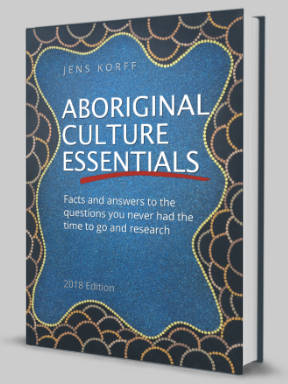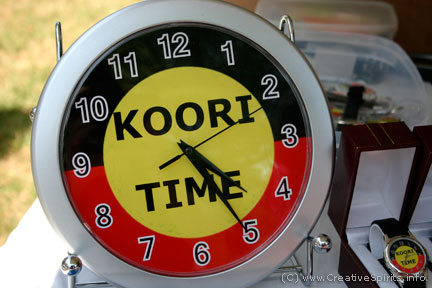People
Aboriginal humour
Aboriginal humour has carried people over many an abyss. Meeting Aboriginal people on 'Koori Time' usually means you have to wait.

Wishing you knew more about Aboriginal culture? Search no more.
Get key foundational knowledge about Aboriginal culture in a fun and engaging way.
This is no ordinary resource: It includes a fictional story, quizzes, crosswords and even a treasure hunt.
Stop feeling bad about not knowing. Make it fun to know better.
Aboriginal Australia has a great history of resistance and a great history of humour.
— Shane Howard, musician [1]

Humour is part of being Aboriginal
One of the key characteristics of Aboriginal people is their humour. No matter how dire the situation Aboriginal people are always able to find a humorous way of dealing with their life.
"When I looked around at all the carnage of our cultural abyss, I saw so much courage and so much laughter," says Aboriginal film-maker Richard J. Frankland [2]. "One of the fundamentals of survival when life is knocking you about is laughter."
Aboriginal filmmaker Angelina Hurley, who wrote a PhD on comedy in film making, agrees. "We're actually really funny people. We don't sit around just talking about politics most of the time; instead, we're telling yarns with our aunties and uncles and making fun of ourselves." [3]
Hurley's debut short Aunty Maggie and the Womba Wakgun had almost instant success upon release.
University of Queensland PhD graduate Pearl Duncan, from Bribie Island, recalls how, growing up, she became "painfully aware of the deprivation, hopelessness and apathy" which abounded in her social environment.
“It seemed incomprehensible that people could laugh when there was no apparent reason.” [4]
Humour has been central to Aboriginal resilience, and a weapon of the weak in the maintenance of identity.
— Pearl Duncan, Aboriginal PhD graduate from Bribie Island [4]
Aboriginal humour is different
Aboriginal humour is different to mainstream humour. "We've got different stories, we've got a different brand of comedy," says Kevin Kropinyeri, an Aboriginal comedian from South Australia [5].
But he acknowledges that it takes time to translate black comedy across the cultural divide for a white audience. "Put me into an Indigenous crowd and I can just be me. With a non-Indigenous crowd you have to explain things. It's just about the wording you use and being more clever with your delivery."
Hurley believes that many Aboriginal messages are more accessible to a wider audience if they are told through comedy rather than serious documentaries [3].
The flip side of tragedy is comedy. We've been laughing at ourselves for generations. What we ask is: laugh with us, not at us.
— Kevin Kropinyeri, Aboriginal comedian [5]
Aboriginal comedians include Mark Bin Bakar (aka "Mary G', Kitja nation), Sean Choolburra (Girramay, Kalkadoon, Pitta Pitta and Gugu Yalanji), Andy Saunders (Biripi) and Kevin Kropinyeri (Ngarrindjeri).
First Aboriginal Prime Minister of Australia - Aboriginal stand-up comedy
Sample Aboriginal jokes
Professor Gordon Briscoe, a man from the Marduntjara/Pitjantjatjara peoples of Central Australia and an Aboriginal activist, researcher, writer and teacher, said when talking about the Aboriginal housing situation:
"We have not yet got to the point of putting solar energy on our roof because many of us don't even have a roof."
Here are some more Aboriginal jokes and sayings:
- What is the TAB called by Aborigines?—The Koori Bank (because many Aboriginal people love to place a bet, but lose their money).
- Where ever there is a will…there's relatives! (Aboriginal saying)
- "One of the best things I think I've probably got is my community degree because that's what you need in black community, not a university degree." [6].
- "It's true I'm married to a Koorie [Aboriginal person from Victoria] girl, I've got the scars to prove it." – Kevin Kropinveri [5]
- "They say that behind every successful black man is a very jealous black woman." – Kevin Kropinveri [5]
- "When we want your opinion, we'll give it to you." – Expresses how 'consultation' for Aboriginal views is often a farce.
- What are 'bluppies'?—Blackfella yuppies!
- In an interview, the Prime Minister is asked if he acknowledges Australia's Aboriginal past. Squeezing his brain he tries to remember what he learned at school. But there is only darkness prior to Cook. "Yes," he says finally, "I can confirm that Australia has a black history."
- How do you call a blackfella with dandruff? – A Lamington. [7]
"Talking about laugh..." is a verbal precedence or ending used frequently by Murris (Aboriginal people from Queensland) when telling their rendition of a funny story or event [8].
A lot of typical Australian humour actually derives from Aboriginal humour, but the nation doesn't acknowledge the Aboriginal element in our make-up.
— Nigel Parbury, author and educator [9]
Our survival has been about laughter, otherwise you cry a river.
— Leah Purcell, Aboriginal director and actor [10]
Comedic storytelling… deters us from the dysfunctional repercussions of our Aboriginal/Indigenous lives caused by colonisation.
— Angelina Hurley, Aboriginal director and writer [8]
Story: A silent conversation with your face
Aboriginal director and writer Angelina Hurley recounts a silent form of Aboriginal humour [8].
"When something nurrigar or womba [strange] happens, I want to look straight at another countryman for that look you know. That silent conversation you have with your face. You now, it entails a lot of eye rolling, eyebrow lifting, lip biting and pursing.
"Mostly when you don't want another relative to know you're gossiping about them, running them down or making fun of them. It can also (depending on circumstance) be accompanied by sound, eg. a grunting or humming.
"I have one cousin back home who is the queen of this phenomenon. She cracks me up without speaking a word."
Aboriginal sketch shows
Jokes are coming hard and fast in Aboriginal sketch shows. Prepare yourself with some knowledge about Aboriginal culture to understand the jokes.
Basically Black
In 1973 the Australian Broadcasting Commission (ABC) produced a television version of the play Basically Black. This was the first all-Aboriginal television show in Australia. The TV version was heavily censored and politically watered-down [11]. The show is still occasionally screened late at night, or as a token gesture around National Aborigines Week every few years.
Basically Black took Aboriginal humour to an extreme level with Super Boong, the fighter against racism. Note that "boong" is a derogative slang word for an Aboriginal person. It shows how Aboriginal people are able to laugh at themselves.
Voiceover: "Is it a bat? Is it a crow? Is it the flying doctor? No! It's Super Boong! Strange visitor from a northern tribe, who came to the city possessing powers far beyond those of mortal praise. Faster than a killer boomerang, and able to leap over tall gum trees... Super Boong uses his secret identity as mild-mannered Aboriginal ex-boxing champion Lionel Mouse to fight a never-ending battle against racism wherever it may be found!"
Super Boong: "Hi, guys. Seen any racism around?"
Black Comedy
In November 2014 the ABC aired a new sketch show, Black Comedy.
The show did not try and appease non-Aboriginal aspirations and concerns, or educate non-Aboriginal audiences. It liberally used Aboriginal English without subtitles.
Its "distinct brand of black humour" is a kind of humour that makes the cultural divide between Aboriginal and non-Aboriginal people more apparent. Aboriginal jokes are told differently and different things are considered funny [12].
The sketch “Black Force” is an Aboriginal version of the American reality show Cops.
Viewers follow the Black Force Officers investigating the crime of blackfellas not acting black enough, a clever take on the very real identity policing experienced by many Aboriginal people within their communities.
Buying a Delta Goodrem CD, eating kale instead of KFC, and driving a Prius could lead to the revoking of one’s “race card” and all of the associated benefits... [12]
Black Comedy is so much more than a 'new' black comedy. It is a show by blackfellas for blackfellas and because of this, Australian television will be all the better for it.
— Chelsea Bond, Senior Lecturer, University of Queensland [12]
In 2014, Australia’s longest running TV soap, Neighbours, celebrated its first Aboriginal actor joining the main cast by casting him as a non-Aboriginal character [12].
Australia's only Aboriginal comedy competition
Deadly Funny is Australia's only Aboriginal and Torres Strait Islander comedy competition. It started in 2005 at the Melbourne International Comedy Festival before spreading to Victoria, South Australia, and New South Wales in 2011.
Previous winners are Kevin Kropinyeri, Shiralee Hood, Mia Stanford and Denise McGuinness. The competition offers comedy workshops, and established comedians travel to Aboriginal communities to help emerging comedians shape their stories and jokes into a stand-up performance.
See also Aboriginal festivals.
Some of the most tragic things in life can be funny to us, I think that's what makes blackfellas so versatile and resilient.
— Sean Choolburra, Aboriginal comedian [13]
'Koori Time'
Aboriginal people have a different understanding of time than white people. They call it Koori Time or TI Time (for Thursday Island in the Torres Strait).
What they mean is that an Aboriginal person is probably not on time as you would expect or estimate differently compared to a whitefella. Russell James puts it well when he talks about his Aboriginal friend Clifton Bieundurry: [14]
"I'd say, 'Well, how long to get there, mate?' And he'd say, 'Oh, just a little bit, 10 minutes', and two hours later we're still driving. I had moments of having to get out and run around in circles and scream aloud in the desert."